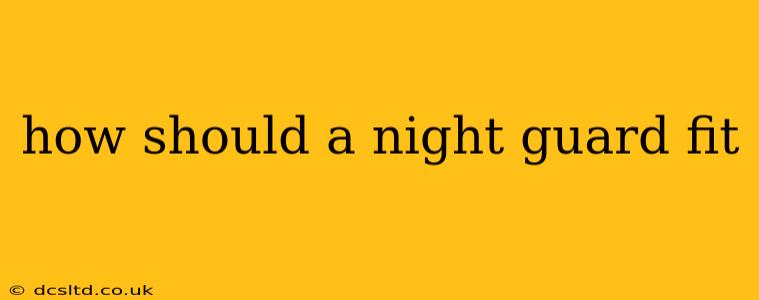How Should a Night Guard Fit? A Comprehensive Guide
Finding the right night guard can significantly improve your sleep quality and oral health. But a poorly fitting guard can be uncomfortable, ineffective, and even harmful. Understanding how a properly fitted night guard should feel is crucial. This guide will address common questions and concerns surrounding night guard fit, ensuring you get the most out of your oral appliance.
What Should a Night Guard Feel Like?
A well-fitting night guard should feel comfortable and secure in your mouth. It shouldn't be so loose that it moves around or falls out during the night, nor should it feel overly tight or constricting. Ideally, it should feel almost unnoticeable after a short adjustment period. Think of it like a perfectly fitting pair of shoes – snug but not squeezing. You shouldn't experience any significant pressure points or discomfort.
Should I Feel Pressure with a Night Guard?
Some minimal pressure is initially normal, especially when you first start using a night guard. However, this pressure should not be painful or intense. If you experience persistent pressure, throbbing, or pain, the night guard likely needs adjustment. Severe discomfort is a sign that the fit isn't right and could potentially lead to jaw problems.
How Tight Should a Night Guard Be?
The night guard should not be so tight that it causes your teeth to feel cramped or your jaw to ache. It should sit comfortably over your teeth, with a slight space between the guard and your gums. There should be no significant pressure on the sides of your mouth or your tongue. A snug fit ensures it stays in place while preventing pressure.
What if My Night Guard Feels Loose?
A loose-fitting night guard is ineffective. It can move around during sleep, hindering its ability to protect your teeth and potentially causing discomfort or even injury. If your night guard feels loose, it's essential to consult your dentist. They can determine if a simple adjustment or a replacement is necessary.
How Do I Know if My Night Guard is Too Big or Too Small?
Too Big: A night guard that's too big will likely feel loose and move around in your mouth. You might experience discomfort or notice it frequently slipping out of position during the night.
Too Small: A night guard that's too small will feel cramped and restrictive. It may apply excessive pressure on certain teeth or your jaw, leading to pain and discomfort. You may also experience difficulty closing your mouth completely.
Can a Night Guard Cause Jaw Pain?
While a properly fitted night guard should alleviate jaw pain caused by bruxism (teeth grinding), an ill-fitting guard can actually exacerbate the problem. If you experience jaw pain while wearing a night guard, it's crucial to consult your dentist to rule out any issues with the fit and assess the underlying cause of your jaw pain.
Should I Be Able to Bite Down on My Night Guard?
Yes, you should be able to bite down comfortably on your night guard. However, avoid clenching your jaw forcefully. The night guard should allow for a natural bite without significant resistance or pressure.
How Long Does it Take to Get Used to a Night Guard?
Most people adjust to a new night guard within a few days or weeks. However, if discomfort persists beyond a couple of weeks, it's crucial to revisit your dentist for an evaluation.
Remember, a properly fitted night guard is essential for its effectiveness and your comfort. Don't hesitate to contact your dentist if you have any concerns about the fit of your night guard. Your dentist can make adjustments or provide a new custom-fitted guard to ensure optimal results and a comfortable sleep experience.
